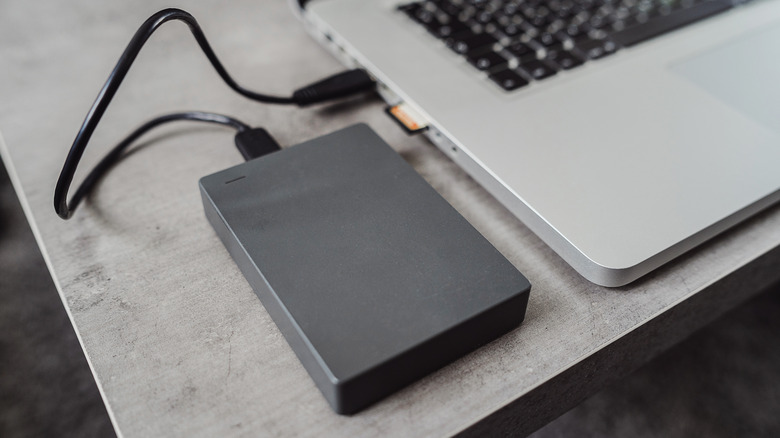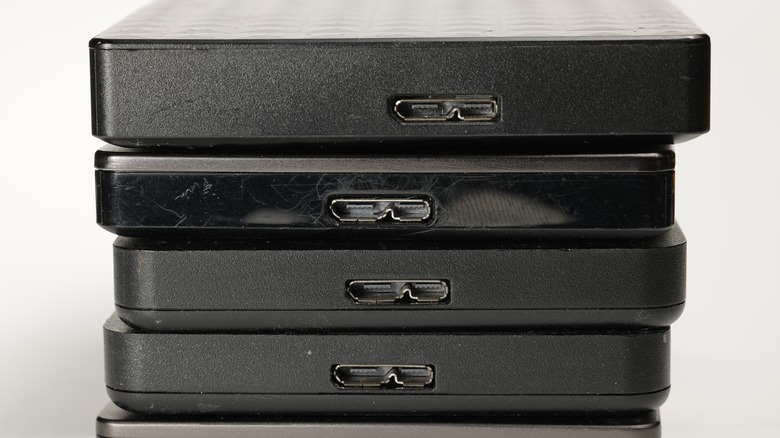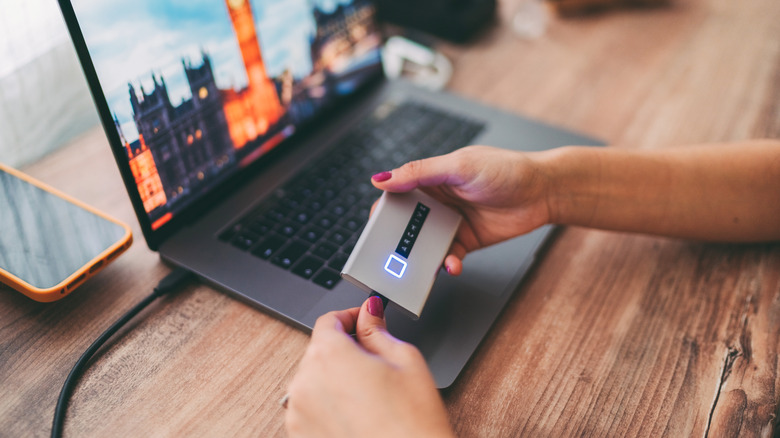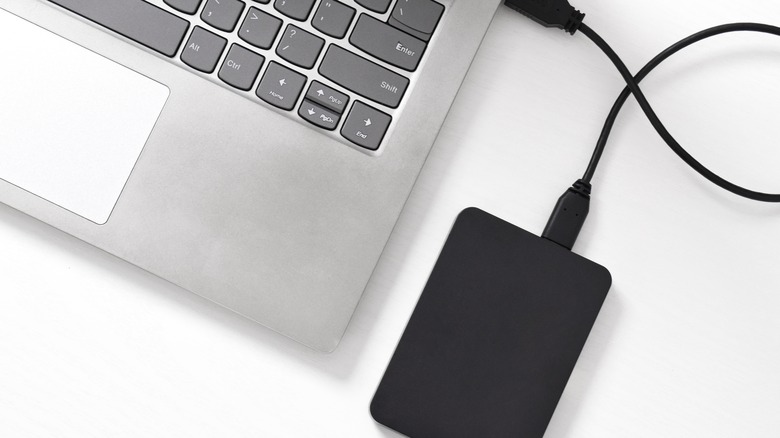Signs Your External Hard Drive Is Failing (And What To Do About It)
With so many uses for external hard disk drives (HDDs), including data storage, file sharing, and gaming, it's unsurprising that many of us rely on the devices in our day to day lives. This regular and widespread use is also precisely why it can spell trouble when they fail. Professionals advise that you can expect your external HDD to last for three to five years, while certain solid state drive (SSD) models could work for a decade or more.
However, regardless of whether it's due to manufacturer issues, mishandling, or regular wear-and-tear, all external HDDs will fail at some point in time. Therefore, it's very important to watch out for the signs of failure, so that you can have the HDD fixed to avoid losing anything vital. Or, at least you'll be able to secure your data and move it to another storage format before your device bites the dust.
There are three common types of failure that you can experience with your external HDD: software, hardware, and connection. So, if you suspect that your device could be at risk, here are some signs you should watch out for, what they might mean, and how you could possibly fix or prevent them.
Signs of external HDD failure
One of the most obvious signs that your external HDD is failing is if you've plugged it in, but it doesn't appear on your computer. On the other hand, it could be possible that you're still able to connect your external HDD, but you encounter issues when trying to read or write files. This can be in the form of freezing, crashing, files disappearing or becoming corrupted upon transfer.
In some cases, an external hard drive can appear to work normally, but be accompanied by weird sounds. Depending on your external HDD model, a little humming is usually expected, especially when transferring large files. However, experts caution that unusual sounds like grinding, clicking, crackling, or beeping, can signal a variety of internal issues.
You may also notice that your external hard drive is a little too hot. Like many types of electronics, external HDDs require a certain temperature range to operate safely in. This will vary across manufacturers and models, but if it's too hot to handle then that's definitely a red flag.
Why your external HDD is failing
Unfortunately, mechanical failure in the HDD can occur without warning, so it's best to avoid purchasing external hard drives from unknown manufacturers or third-party sellers who do not offer warranty or support. It is also possible to exacerbate the effects of normal HDD degradation through exposure to dirt, dust, and moisture.
Exposing your external hard drive to extreme temperatures, both cold and heat, can also lead to unexpected temporary or permanent damage to its internal components. Assuming your HDD is already at 104 degrees Fahrenheit (or 40 degrees Celsius), Data Center Dynamics warns that there is a 30% increase in the chance of failure every time the operating temperature increases by a further 41 degrees F (or 5 degrees C). A high operating temperature can be due to several factors, such as high usage and airflow restrictions due to particulate build up or fan cleanliness.
Although some HDD failures can be attributed to not ejecting it properly, Norton cautions that issues with hard drive corruption can also be due to software bugs, viruses, or malware, which can be picked up from infected devices. Furthermore, if you are experiencing strange noises coming from your external HDD, this could be due to the power supply or other mechanical problems.
What to do if your external HDD is failing
If your external hard drive is already hovering around the age of its expected lifespan or exhibiting some signs of possible failure, the first thing you should do is secure your data in an alternative storage option. Then, you can proceed to determine whether the problem can be resolved by yourself or if it requires professional intervention. Typically, manufacturers offer diagnostic tools that you can use to identify problems with your external HDD, such as SeaTools or Western Digital Dashboard. However, some of these tools may only be available on limited operating systems.
For Mac users, you can conduct First Aid on your external HDD using the native Disk Utility tool. After you've plugged in your external hard drive, here is what you have to do:
- On your Mac, launch the Disk Utility app.
- In the left side bar, locate your external HDD name under External.
- In the upper portion of the screen, click First Aid.
- In the pop-up, click Run.
For some concerns, especially those that you suspect can be attributed to internal hardware problems, it may be best to send your HDD for professional evaluation. If your external hard drive is still under warranty the manufacturer may be able to repair it for free or send you a replacement. Just make sure to choose a trusted repair center who will make an effort to keep your data safe.
How to prevent external HDD failure
Thankfully, when it comes to making sure that you get your money's worth with your external hard drive, there are several precautions you can take to keep it running for as long as possible. One of the most straightforward things you can do is simply make sure you store it properly to prevent damage from any unexpected impacts. A good external HDD case can also act as a layer of protection from liquid, dirt, and dust.
To avoid malware, you should also stop plugging your external HDD into unknown devices, including other people's computers or at printing shops. It's simple enough to send files via email or copy files into a thumb drive instead. If you suspect that your external HDD or computer may have already been infected by malware here are a few signs to watch out for, plus some of the most popular antivirus programs that you can consider downloading to prevent any issues in the future.
Of course, no matter what kind of preventative steps you put into place, accidents can happen and it's always recommended to back up important files in multiple devices and locations to reduce your overall risk.




